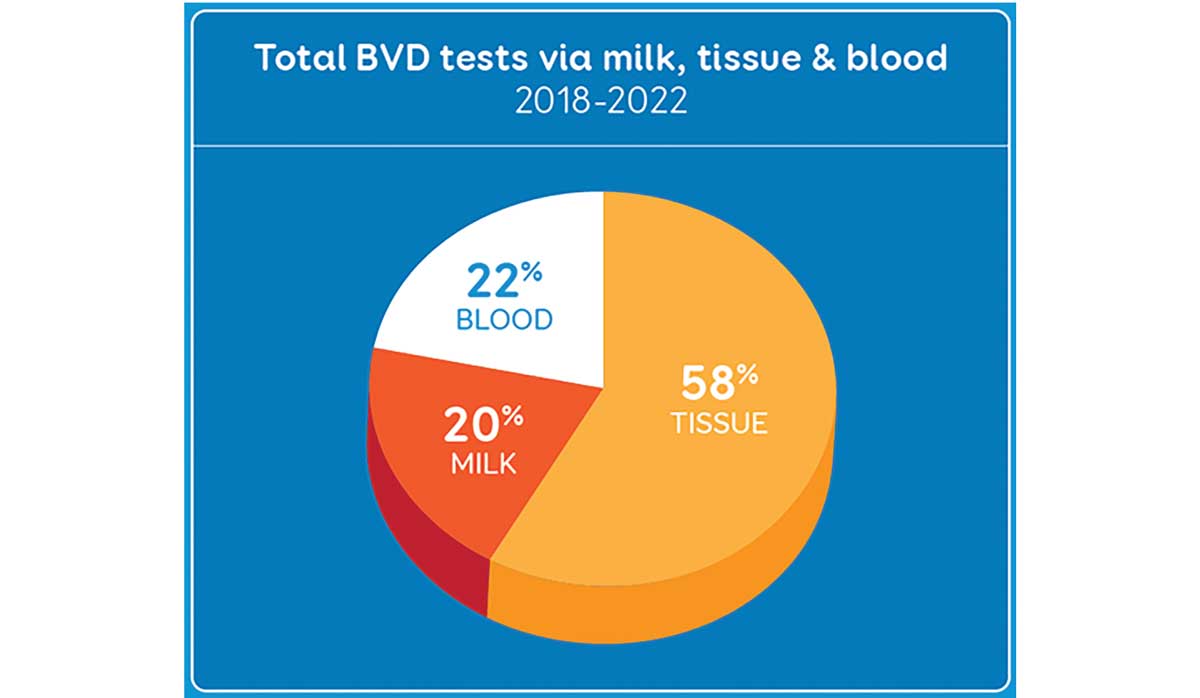Genetics, Efficiency and Performance: How the Burgesses are raising the bar at Te Poi
Bill and Michelle Burgess had an eye-opening realisation when they produced the same with fewer cows.
Bovine Viral diarrhoea (BVD) is one of the most infectious diseases in cattle, causing major economic losses worldwide.
Annual losses for dairy farmers are estimated at around $127 million, according to DairyNZ.
With the diagnostic tests and vaccines currently available, it should be easy to break the BVD cycle in infected herds. However, at the current level of disease infection in the cattle population, and poor biosecurity practices on farm, it is estimated that at least 5% of herds are experiencing new BVD outbreaks each year (BVDFree.org.nz).
The ability to determine Persistently Infected (PI) animals through testing provides a compelling opportunity to control and potentially eradicate BVD within New Zealand. Increasing the proportion of the national herd tested will likely reduce prevalence of persistently infected animals and hence the incidence of BVD.
In addition to testing for BVD, recording a lifetime status based on this testing would simplify the identification of PI animals in the case of a BVD incursion and should increase the resale value of stock. As more animals have a lifetime status recorded, it will reduce the risk of new introductions into naïve herds, help with stock purchasing decisions, and lead to better BVD management throughout NZ.
According to DairyNZ approximately 80% of NZ dairy and beef herds have been exposed to BVD.
For many years LIC has devoted an extensive amount of time to the development of BVD test options, as well as building awareness of BVD within the New Zealand dairy industry. The Bulk Milk Monitor pack continues to service approximately 50% of dairy herds in New Zealand. Since the development of the Bulk Milk Monitor pack, LIC has enhanced this test, now known as the BVD Status Pack, and this provides individual testing for all animals in the milking herd using herd test milk samples.
 |
|---|
|
|
The BVD Status pack, has been designed to enable easy, convenient, and cost-effective testing of individual animals in the milking herd whose lifetime BVD Status can be uploaded to LIC’s MINDA software.
This testing will detect both positive and negative animals within the herd. Allowing herds with a BVD infection to find the PI animal/s quickly and efficiently, and negative herds to benefit from additional animal information in MINDA.
In addition to milk testing, LIC can process tissue and blood samples for BVD. A significant number of calf samples are processed for BVD using the same tissue samples that are submitted for parentage testing.
The graph shows the proportion of individual BVD tests completed at LIC since 2018 on tissue, milk and blood, totalling almost 950,000 samples. Most of these results will have been uploaded to MINDA.
Supplied by LIC
New Zealand's new Special Agricultural Trade Envoy, Horowhenua dairy farmer, company director and former Minister of Agriculture, Nathan Guy says the Free Trade Agreement (FTA) with India is a good deal for the country.
New figures show dairy farmers are not only holding on to their international workforce, but are also supporting those staff to step into higher-skilled roles on farm.
New tractor deliveries for 2025 jumped 10% compared to the previous year, a reflection of the positive primary sector outlook, according to the Tractor and Machinery Association (TAMA).
Entries have opened for two awards in the New Zealand Dairy Industry Awards (NZDIA) programme, aimed at helping young farmers progress to farm ownership.
Federated Farmers has confirmed interim chief executive Mike Siermans to the role.
Registrations are now open for the 2026 Ruralco Golf Classic, with all proceeds from the event set to support the Mid Canterbury Rural Support Trust.
OPINION: When it comes to New Zealand's foreign relations, Foreign Minister Winston Peters likes to make all the big calls;…
OPINION: Another example of the dairy sector getting shortchanged in free trade deals?